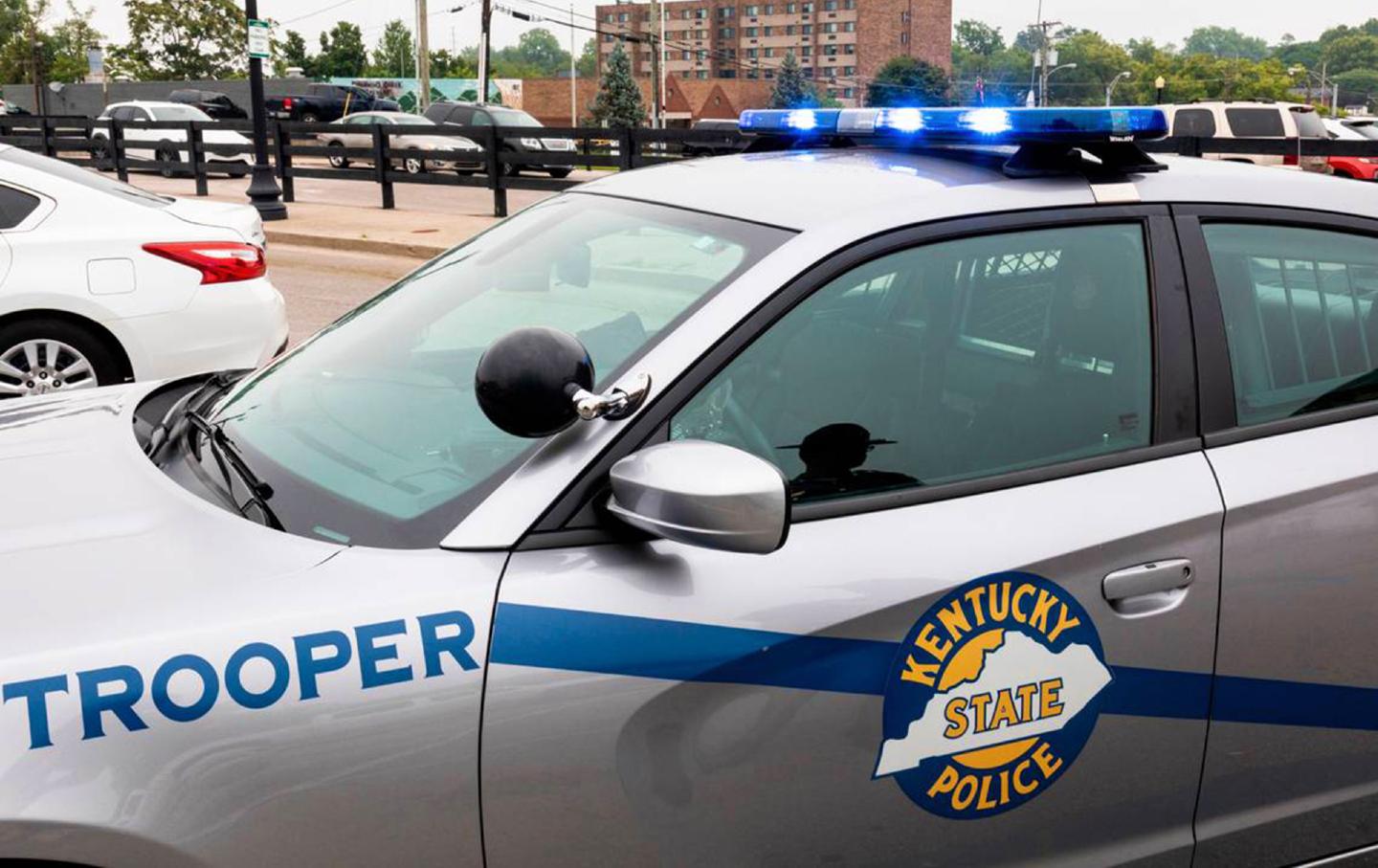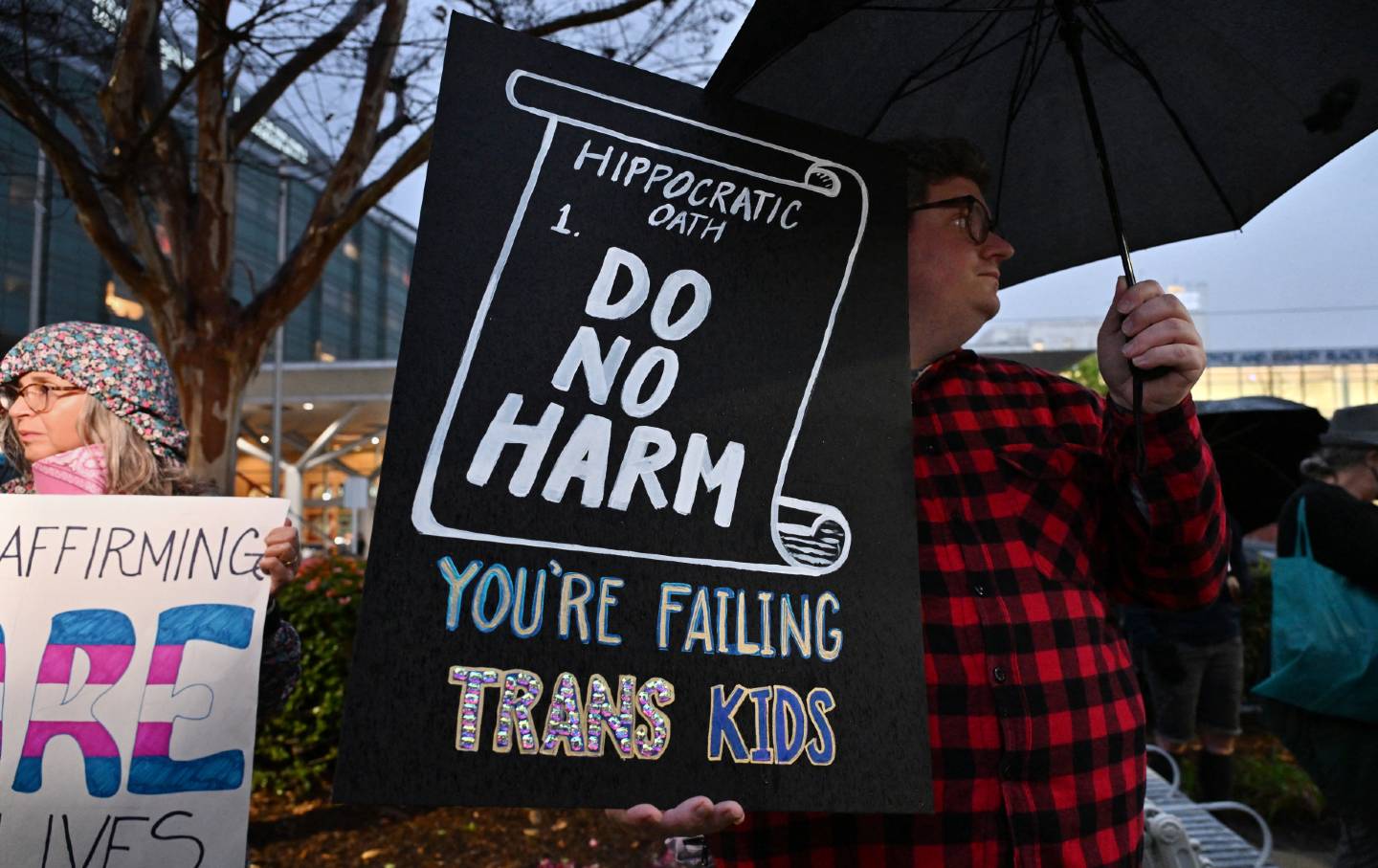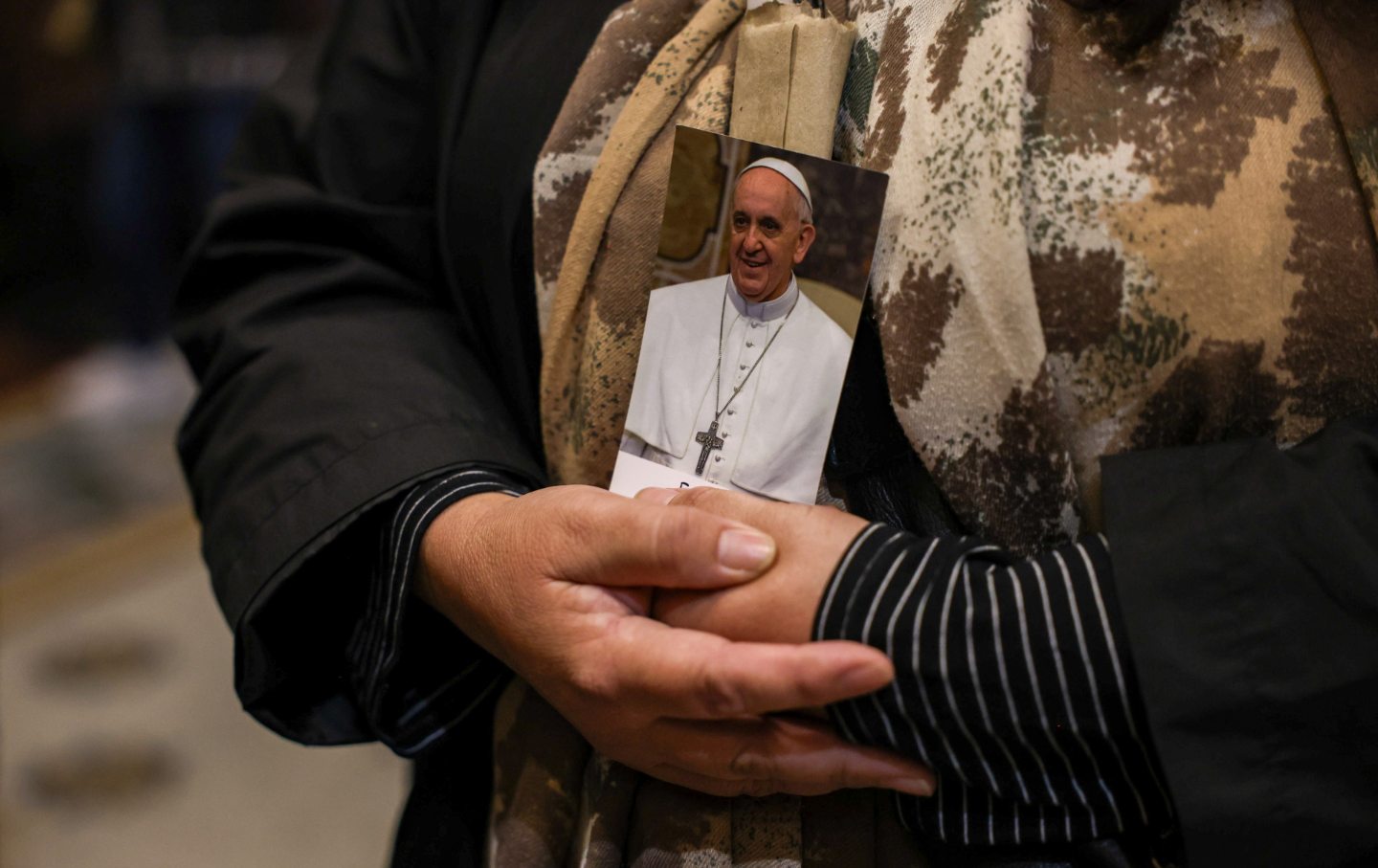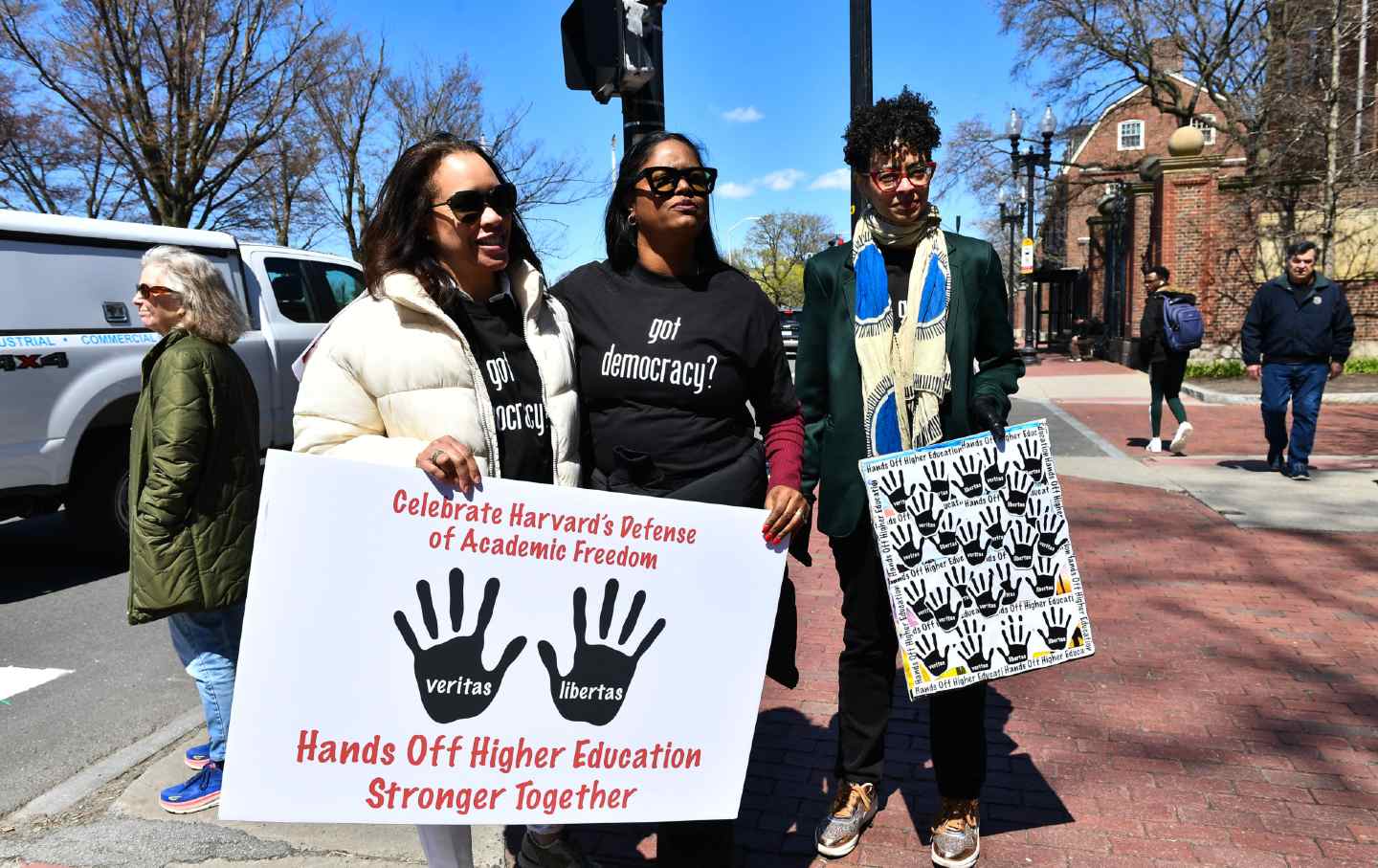Kentucky Is About to Pass the Cruelest Criminal-Justice Bill in America
The state is making it easier to kill homeless people on private property—and that’s just one part of one of the most draconian crime bills in recent history.

A Kentucky state police cruiser.
(Silas Walker / Lexington Herald-Leader / Tribune News Service via Getty Images)On March 14, the Kentucky Senate Judiciary Committee voted to approve HB 5, the “Safer Kentucky Act.” The legislation will now head to the Senate floor for a vote, and it will almost certainly pass. The 78-page bill criminalizes homelessness—and decriminalizes the use of deadly force against individuals engaging in “unlawful camping.” Under this law, if a property owner believes an unhoused trespasser is attempting to commit a felony or attempting to “dispossess” them, they can shoot the homeless person.
That’s not all. “Really, this is like 20 bills packed into one,” Kaylee Raymer, a criminal-justice policy analyst at the Kentucky Center for Economic Policy, told us. A slew of “tough on crime” policies would create or enhance penalties for sleeping in your car, damaging your apartment while moving out, or fleeing from police. It will institute a three-strike rule, where the third strike is either a mandatory life sentence or execution. The result will be more people in prison for a longer time. The bill is a rewind to the failed policies of the 1990s.
More than a hundred advocacy groups in Kentucky oppose the bill, but they face a veto-proof supermajority of Republicans animated by fears of a nonexistent crime wave, driven by a desire to control Democratic cities, and backed by a conservative think tank pushing similar legislation across the country. HB 5 is the most extreme anti-homeless, tough-on-crime bill introduced in a state legislature this year—and copies of HB 5 could soon start popping up across the country.
Catherine McGeeney, the director of communications at the Coalition for the Homeless of Louisville, told us, “It’s just unfathomable cruelty.”
When state Representative Jared Bauman presented the first version of the bill during a September press conference, advocates immediately recognized the provisions against the homeless. Kentucky lawmakers had lifted it, in part, from model legislation published by the Cicero Institute, a conservative think tank founded by Palantir alum Joe Lonsdale that focuses “on fixing broken systems in the public sector.”
According to the Cicero Institute, the think tank’s “model legislation has been enacted in Missouri, Tennessee, Texas and Utah,” and its homelessness policies have advanced in legislatures in 20 states.
If HB 5 passes, sleeping outside in public or on private property would become “unlawful camping.” First offenders would be fined $250. Further offenses could result in a Class B misdemeanor, which carries the same fine and up to 90 days in jail. Someone who just needs a bed could find themselves in a cycle of fines and jail time. Local governments would be forbidden from preventing or discouraging enforcement of these provisions.
Legal experts argue that bills like the Safer Kentucky Act punish individuals for forces outside of their control. As McGeeney explained, people don’t sleep in public by choice. “The cause of homelessness is a lack of housing that’s affordable, decent, and safe,” she said. Louisville, a blue dot in a red state, is “short 31,000 units of housing for the poorest people,” she continued, “and shelters are full nearly every single day.”
Advocates told us the only way to make unhoused people safer is to put a roof over their heads. Studies have shown that housing assistance—not incarceration—reduces crime, increases employment, and improves health for the community. In 2023, the Louisville Coalition for the Homeless’s supportive housing program found shelter solutions for 1,700 people, but that same year, 4,000 entered homelessness. “The issue isn’t that our solutions are ineffective,” McGeeney explained. “It’s that they’re poorly funded. Now we’re blaming people for being poor.”
Kentucky is far from the only state facing a worsening crisis of homelessness. Some 4,700 residents in Kentucky found themselves unhoused in 2023, and nationwide about 653,000 people were in the same situation that year. Kentucky is also not the first to respond to it punitively.
On the West Coast, where homelessness is often most visible, Democrats have joined forces with Republicans to criminalize homelessness and sweep people on the street through citywide bans on camping and embroiled legal fights that have made their way to the highest court in the nation.
That bipartisan campaign has reached the Supreme Court, which will begin hearing Grants Pass v. Johnson on April 22 to effectively determine whether cities can punish people for sleeping in public. Should the court rule this permissible—which is likely—it could have a domino effect on legislation and ongoing lawsuits protecting the unhoused across the country.
The part of HB 5 that makes it lawful in certain circumstances for people to shoot homeless people on their property will only “encourage reckless gun owners to kill first, ask questions later,” Kelly Sampson, director of racial justice for the nonprofit Brady, told CBS News last year.
The Safer Kentucky Act creates the opportunity for vigilantism against “violent crime”—with impacts far beyond the homeless population. The state already has strong “stand your ground” laws. Individuals do not have to retreat before using deadly force and are immune from prosecution or civil action. Police are also generally forbidden from arresting anyone who used such force. A 2022 study found that “stand your ground” laws led to an 8 to 11 percent increase in gun homicides and violent deaths. HB 5 expands these laws. In speech on the House floor, Democratic state Representative Keturah Herron argued that the bill “takes us back to 1955, when it was OK to hunt people down based on an accusation.”
What counts as a reasonable use of such force is not clear, a vagueness Raymer thought might be intentional. “The scary thing,” she said, “is that it will have to play out in real life,” with a jury deciding whether an individual who killed a homeless person crossed the line.
When the bill came to the House floor in Kentucky, politicians cited 117 academic sources to argue that the bill would “absolutely, unequivocally lead to safer communities and less crime.” But when Representative Bauman released the list of citations, a Kentucky Public Radio review found that about 40 percent of the cited articles “appear to have little to nothing to do with the legislation.”
Some authors expressed confusion at the use of their work to justify this bill. “Anyone who says that my work supports a ‘tough on crime’ approach has not read it,” Todd Clear, a Rutgers professor of criminal justice, told us.
Popular
“swipe left below to view more authors”Swipe →Christine Visher, a Delaware sociology professor cited in the bill, said, “Legislation premised on ‘increasing crime rates’ is not responding to current trends.” She added that her current work differs markedly from the 1987 article used by Bauman to justify HB 5. “This bill seems to be repeating history,” Visher warned.
Beyond pushing for harsher sentencing, the bill also puts private property first. For example, any amount of what a landlord believes is intentional damage caused while a tenant moves out could result in a criminal mischief charge.
The legislation does not come cheap. Research from the Kentucky Center for Economic Policy found that HB 5 would cost the state more than $1 billion over a decade. Much of that cost comes from provisions requiring longer prison sentences.
HB 5’s three-strike law would mean that people convicted of three violent crimes could face prison for life. These types of enhanced sentences are not new. In the 1990s, nearly half of states and the federal government began targeting violent crime through such measures. Across the country, individuals were sentenced to life behind bars for crimes like stealing a slice of pizza or a few rolls of toilet paper. One study from 2001 found that three-strike laws led to a 23–29 percent increase in homicides.
As Visher noted, a review of California’s since-revoked three-strike law found that it did not reduce crime, instead condemning “a disproportionate number of nonviolent offenders [to] being sentenced to unusually long prison terms at the great expense of the taxpayer.”
Kentucky already has laws on the books enhancing penalties for repeat offenders, but HB 5 goes further. It removes time limits, categorizes more offenses like burglary or carjacking as “violent”—which means the convicted would be forced to serve at least 85 percent of their sentence instead of 20 percent—and makes a third strike punishable by life without parole or death.
“This has been done many times,” Raymer said. “People have studied the effects and know it’s not a good way to reduce crime. It’s incredibly expensive, and it harms people of color disproportionately.”
A 2021 Prison Policy Initiative study found that if Kentucky were a country, it would already have the seventh-highest rate of incarceration in the world behind six other Southern US states.
HB 5 would push even more people into Kentucky’s already overcrowded jail and prison system.
Many jails in Kentucky are already over 150 percent capacity. From 2000 to 2019, the number of local inmates held in the state on an average day more than doubled.
HB 5 would ban “any charitable bail organization from posting bail in excess of $5,000,” or for any violent offense or for a person being involuntarily held for substance use disorder. According to the Kentucky Bail Project, over half of those held pretrial can’t afford their cash bail; without help, thousands of Kentuckians will spend hundreds of thousands of days behind bars.
“If incarceration solved our problems,” McGeeney said, “maybe we would already have public safety.”
Many Democrats in Kentucky, including Louisville’s mayor Craig Greenberg and Governor Andy Beshear, have been conspicuously absent from the fight against HB 5. Advocates said they hoped Beshear would veto the bill, even if the Republican veto-proof supermajority makes it a symbolic gesture. Though advocates desperately worked to convince Republicans to remove some of the most harmful aspects of HB 5, Senate Republicans voted down a slightly softer version of the bill put forth by Republican Judiciary Committee chair Whitney Westerfield on Thursday.
Without serious pushback, HB 5 won’t be the last radical “tough on crime” law to pass. “They don’t stop,” Lyndon Pryor of the Louisville Urban League said. “They keep coming. The next bill will be worse, and worse again. At some point, you just have to fight back.”
“I hope everyone sees this,” Stephanie Johnson of advocacy group VOCAL-KY said, “and helps Kentuckians fight this evil. It’s not giving anyone a chance. It’s knocking out all the work that’s been done over the past 40 years.”
Hold the powerful to account by supporting The Nation
The chaos and cruelty of the Trump administration reaches new lows each week.
Trump’s catastrophic “Liberation Day” has wreaked havoc on the world economy and set up yet another constitutional crisis at home. Plainclothes officers continue to abduct university students off the streets. So-called “enemy aliens” are flown abroad to a mega prison against the orders of the courts. And Signalgate promises to be the first of many incompetence scandals that expose the brutal violence at the core of the American empire.
At a time when elite universities, powerful law firms, and influential media outlets are capitulating to Trump’s intimidation, The Nation is more determined than ever before to hold the powerful to account.
In just the last month, we’ve published reporting on how Trump outsources his mass deportation agenda to other countries, exposed the administration’s appeal to obscure laws to carry out its repressive agenda, and amplified the voices of brave student activists targeted by universities.
We also continue to tell the stories of those who fight back against Trump and Musk, whether on the streets in growing protest movements, in town halls across the country, or in critical state elections—like Wisconsin’s recent state Supreme Court race—that provide a model for resisting Trumpism and prove that Musk can’t buy our democracy.
This is the journalism that matters in 2025. But we can’t do this without you. As a reader-supported publication, we rely on the support of generous donors. Please, help make our essential independent journalism possible with a donation today.
In solidarity,
The Editors
The Nation








